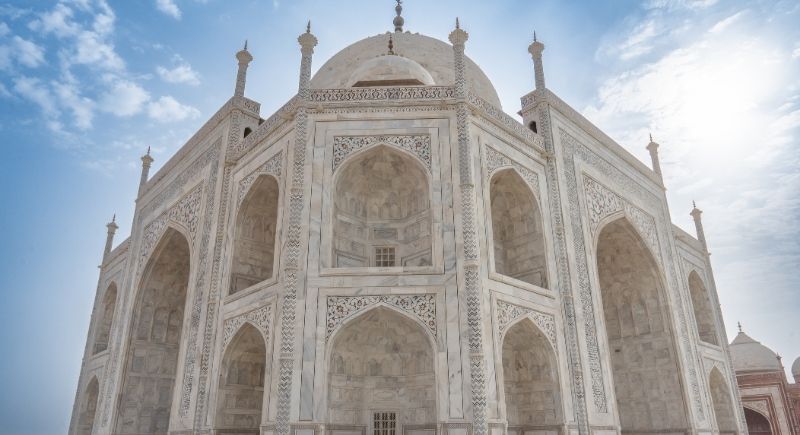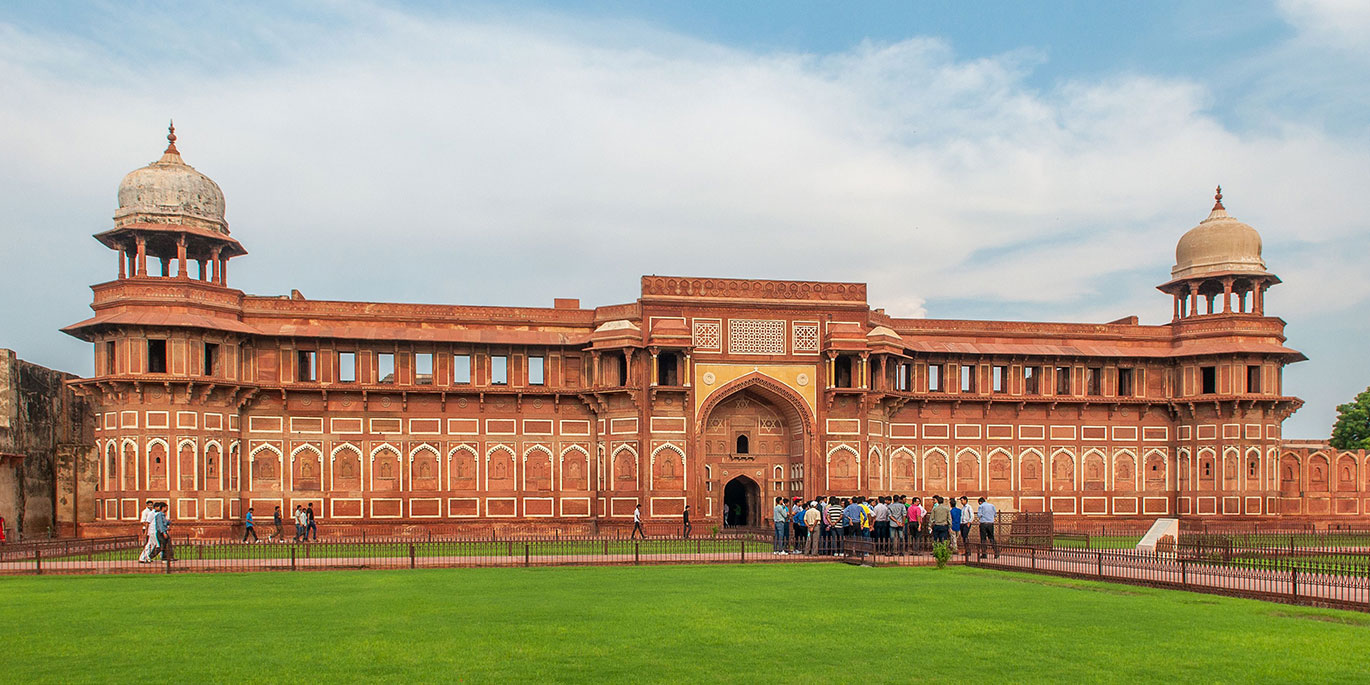I had been planning to visit the Taj Mahal; however, my visit was postponed for several reasons. Last month, I finally visited the beautiful Taj Mahal after years of waiting.
The Taj Mahal is one of the most famous buildings in the world and is located in the Indian city of Agra in Uttar Pradesh. It is one of the Seven New Wonders of the Modern World and a UNESCO World Heritage Site.
How to reach the Taj Mahal :
Nearest Airport to Taj Mahal:
The nearest airport to Taj Mahal is Agra Airport, which is at a distance of 13 km. It will take 35 minutes to reach the memorial by taxi from the airport.
Nearest Railway Station to Taj Mahal:
The closest railway station is Agra Cantt, 6 km away. It is about 13-minute drive via auto or cab from the railway station.
Nearest Bus Stand to TajMahal:
The Idgah Bus Station is the biggest and most prominent bus terminal in Agra and is 6 km from the Taj Mahal. You can hire a taxi or hail an auto to reach the monument. It takes approx 15 minutes. You can also hire a rickshaw puller to reach the Taj Mahal from the bus station.
By Road:
If you are coming from Delhi NCR by road, you can take the Yamuna Expressway connecting Greater Noida with Agra, a 165 km drive.
Since I was traveling from Delhi, I booked a train ticket and reached the railway station on time. Fortunately, the train was not late, and I boarded it. In the morning, I reached Agra.
I hired a cab to reach my hotel, which was already booked.
The best time to visit the Taj Mahal
Timings and entry fees for the Taj Mahal
Foreign Tourists-
INR 1300. The basic Taj Mahal entry fee is Rs. 1100, and an additional charge of Rs. 200 for visiting the central mausoleum.
Citizens of SAARC and BIMSTEC countries-
INR 740. The basic entry fee is Rs. 540, and an additional charge of Rs. 200 for visiting the central mausoleum.
Domestic/Indian/OCI Cardholder
– INR 250. The basic entry fee is Rs. 50, and an additional charge of Rs. 200 for visiting the central mausoleum.
Here a few Facts about the Taj Mahal:
The Taj Mahal’s minarets are not perpendicular- To safeguard the tomb or main structure if a minaret were to collapse, the minarets surrounding the monument are not vertical but slanted outward.
The artisans who created this beauty were amputated, although others claim it is all a ruse. It is believed that the craftsman who made it had their hands severed.
The base of the Taj Mahal is made of wood- Shah Jahan used excellent architecture and science when he constructed the monument on a timber foundation along the banks of the Yamuna. With one exception: He should have considered the Yamuna drying up.
Taj Mahal has to have a black twin- It was alleged that it was never built since Shah Jahan’s son Aurangzeb overthrew him. This rumor is supported by the marble ruins in Mehtab Bagh, Moonlight Garden, across the river.
Comprehensive guide to covering the Taj Mahal
Make sure to notice Mehtab Bagh if you plan a Taj Mahal trip. The final of Agra’s 11 parks along the Yamuna River is the crescent-shaped Mehtab Bagh. Shah Jahan reconstructed the garden to shield this monument from sand erosion. This garden’s location ensures that the Taj Mahal is obvious. Mehtab Bagh, known as “Moonlight Garden,” is one of Agra’s most picturesque tourist destinations.
Things to do in Taj Mahal
The gardens surrounding the Taj Mahal Complex.
Tomb
The tomb serves as the focal point of the entire complex. It is a sizable, white marble building with an iwan (an arch-shaped doorway) and a big dome and finial on top that stands on a square foundation.
Exterior Decorations
Minaret:
Four equal-height minarets surround the Taj Mahal tilt slightly outward to shield the tomb from a natural disaster.
Plant Motifs:
Ginger flowers, a shrub with a conical flower that can be seen in the mosque, have been inscribed on the Taj Mahal.
Base & Dome:
Four smaller domed chattris (kiosks) at its corners, which mimic the central dome’s onion-shaped design, highlight the dome’s shape.
Finial &Tamga– The TajMahal’s top feature is its finial or tamga. The material is metal.
Interior Decorations
Pietra Dura:
From a broad perspective, the craft of carving stone is known as pietradura. It entails creating decorative objects by encrusting stones on previously abraded marble plates.
Archways:

Eight pishtaq arches, which create four upper central arches, define the space. These turn into balconies and viewing rooms with stunning views from the exterior windows and ornate marble screens. These windows and the apertures in the corners of the roof both let in light.
Jali Work:
Traditional jaalis were a significant aesthetic component of Indian, Indo-Islamic, and Islamic architecture and required intensive artistry by artisans. While the Mughals eventually used extremely finely carved plant-based designs, as seen at the Taj Mahal, the early Jaali work featured cutting into stone, typically in geometric patterns.
Places to visit near the Taj Mahal
There are many places to visit near the Taj Mahal. Here are a few of the most well-known.
Agra Fort-

The Agra fort, which spans 94 acres along the river Yamuna’s banks, is about 2.5 kilometers from the Taj Mahal. It is one of the best places to visit near the TajMahal.
Entry Fee: Indian citizens pay Rs. 35, whereas outsiders pay Rs. 550.
FatehpurSikri–
Around 44 kilometers separate the TajMahal and FatehpurSikri; travelers can travel this distance via buses and other public transportation.
Entry Fee: Indian citizens pay Rs. 35, whereas outsiders pay Rs. 550.
Jama Masjid:
Taj Mahal to Jama Masjid travel time is 3 minutes. The Taj Mahal and Jama Masjid are roughly 3 kilometers, 1.9 miles, or 1.6 nautical miles apart by car. The amount of time required to travel a distance in an automobile is called travel time.
Entry Fee: No Entry Fee
Taj View Point A.D.A. -
Near Mehtab Bagh– Tourists will be permitted admission to the new viewpoint at MehtabBagh, 6.6 kilometers from the Taj, between 7 and 10 in the morning and 7 and 10 in the evening.
Entry Fee: Rs. 20
After Spending 2 days in Agra and nearby Areas, I Came back to Delhi via train. As I bid farewell to the majestic Taj Mahal, its ivory-white splendor still etched in my mind, I embark on my journey back to Delhi. The grandeur of its marble façade, the intricate details of its architecture, and the timeless love story it symbolizes have left an indelible mark on my soul. As the sun sets behind the minarets, I carry with me not just memories, but a deeper appreciation for India’s rich heritage and the stories that echo through its ancient walls. Until we meet again, dear Taj, I take with me the promise of returning to your embrace.




















